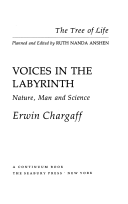We Know Too Much About the Wrong Things
In science, attempts at formulating hierarchies are always doomed to eventual failure. A Newton will always be followed by an Einstein, a Stahl by a Lavoisier; and who can say who will come after us? What the human mind has fabricated must be subject to all the changes—which are not progress—that the human mind must undergo. The 'last words' of the sciences are often replaced, more often forgotten. Science is a relentlessly dialectical process, though it suffers continuously under the necessary relativation of equally indispensable absolutes. It is, however, possible that the ever-growing intellectual and moral pollution of our scientific atmosphere will bring this process to a standstill. The immense library of ancient Alexandria was both symptom and cause of the ossification of the Greek intellect. Even now I know of some who feel that we know too much about the wrong things.
Notes:
The Library of Alexandria was "both symptom and cause of the ossification of the Greek intellect."
Folksonomies: information overload analysis paralysis
Taxonomies:
/science (0.594046)
/science/physics (0.499409)
/technology and computing/consumer electronics/camera and photo equipment/telescopes (0.482352)
Keywords:
equally indispensable absolutes (0.989327 (negative:-0.540121)), relentlessly dialectical process (0.952967 (negative:-0.324022)), human mind (0.873335 (neutral:0.000000)), eventual failure (0.754945 (negative:-0.673006)), moral pollution (0.681261 (negative:-0.493876)), necessary relativation (0.679655 (negative:-0.540121)), wrong things (0.678547 (negative:-0.675744)), immense library (0.676259 (negative:-0.439773)), ancient Alexandria (0.675393 (negative:-0.439773)), scientific atmosphere (0.673578 (negative:-0.493876)), Greek intellect (0.666853 (negative:-0.439773)), Greek intellect. (0.641444 (negative:-0.451131)), symptom (0.551380 (negative:-0.445452)), cause (0.514390 (negative:-0.445452)), science (0.511477 (negative:-0.324022)), Lavoisier (0.497126 (neutral:0.000000)), standstill (0.490229 (negative:-0.493876)), hierarchies (0.488041 (negative:-0.673006)), ossification (0.487568 (negative:-0.445452)), Stahl (0.478851 (neutral:0.000000)), Einstein (0.470304 (positive:0.391813)), Newton (0.463122 (positive:0.391813)), words (0.454786 (neutral:0.000000))
Entities:
The Library of Alexandria:Facility (0.887651 (neutral:0.000000)), Alexandria:City (0.834579 (negative:-0.439773)), Lavoisier:Degree (0.775930 (neutral:0.000000)), Newton:Person (0.665801 (positive:0.391813)), Stahl:Person (0.665623 (neutral:0.000000)), Einstein:Person (0.656223 (positive:0.391813))
Concepts:
Alexandria (0.982208): geo | website | dbpedia | freebase | yago | geonames
Science (0.849652): dbpedia | freebase | opencyc
Psychology (0.755704): dbpedia | freebase | opencyc
Human (0.699509): dbpedia | freebase | opencyc
Philosophy (0.691110): dbpedia | freebase | opencyc
Physics (0.673012): dbpedia | freebase | opencyc
Metaphysics (0.640056): dbpedia | freebase | opencyc
Library of Alexandria (0.623755): geo | website | dbpedia | freebase | yago





